- Home
- Robert J. Harris
The Thirty-One Kings Page 12
The Thirty-One Kings Read online
Page 12
I did my best to show no flicker of recognition at the phrase. ‘I’ve no idea what you’re talking about.’
Beata eyed me scornfully. ‘Oh, come now, why else would you be seeking out Klingsor at this late stage of the game? You wanted to find the man named Roland.’
She leaned towards me, smiling as she ran a finger around the winged horse on her brooch, using this symbol of freedom to mock my helplessness.
My head was clearing now and my thoughts began to move swiftly. There was no use denying my purpose and perhaps there was a slim chance of gaining some information even now.
‘I suppose you’re holding him prisoner here just like me,’ I said in a voice that was deliberately hopeless.
‘Here? In my own home?’ The notion seemed to amuse her. ‘No, I would not keep so valuable an item here. Rest assured he is stored in a very safe place. Soon he will be in the hands of people who are expert at gaining answers to difficult questions.’
‘And I’ll no doubt be handed over to your friends in the Gestapo.’
‘Oh no, Hannay, I have something much better in mind for you.’ There was in her voice an echo of that childish vindictiveness I had heard before. ‘They would undoubtedly make you suffer prolonged questioning followed by a firing squad or an eternity starving in some obscure dungeon. But you and I have a private score to settle and I will let nothing interfere with that.’
My temper rose. ‘If you want to shoot me, why don’t you get on with it?’ I said. ‘I’m growing tired of your nasty little games.’
‘To shoot you would be to give you a soldier’s death, which would be too much to your liking.’ Her mouth distorted into an ugly smirk. ‘No, I will not grant you that dignity. Your death will be slow and ignominious. You will breath out your last in solitary darkness, knowing that your own rashness carried you straight into my waiting hands.’
The deep, disfiguring scars on her soul were becoming more and more evident, and I began to wonder what sort of a war such wickedness was leading us all into.
‘You know,’ I said, ‘there was a time when your people, for all their misdeeds, were capable of a degree of magnanimity, when most of them still recognised what was decent and what was not.’
‘There is a new Germany now,’ Beata declared proudly, ‘capable of bold action that lies beyond the bounds of your imagination. You are too much of a gentleman to conceive of such things. Even now, the racially impure, the depraved and the disabled are being erased so completely that future generations will not even know they existed.’
‘I suppose all this is to clear the way for the superman we hear so much about,’ I said. ‘Frankly he sounds to me like a bit of a swine.’
‘How limited you are,’ she sneered, ‘stuck away on your little island reminiscing about your past glories over your port and cigars. I suppose you must view me as some sort of monster.’
With an effort I shook my head. ‘You are a child orphaned by war seeking empty revenge against a world that has treated you cruelly. I feel sorry for you.’
She moved so quickly in her fury that I was taken by surprise when she lashed the back of her hand across my face.
Leaning closer, she said, ‘Save your pity for yourself, Hannay. The world is no longer a place where you good old chaps are fit to survive. You will be swept away along with your titles, your country houses and your empty-headed wives serving afternoon tea.’
My cheek burned like the devil but I managed a hoarse chuckle. ‘Clearly you’ve never met my wife.’
That small act of violence appeared to calm Beata and she regained her self-possession.
‘When we searched you we found little of interest.’ From the table to her right she picked up my copy of The Pilgrim’s Progress. She flicked disinterestedly through the pages, her lips curled in mockery. ‘And what is this?’ she asked, waving it in front of my face. ‘Some sort of religious tract?’
‘I suppose that’s all it could be. To you.’
‘How pitiful.’ She slipped the book into my jacket pocket. ‘Here, you can keep it. When you die you can take your god with you.’
‘What are you going to do?’ I asked. ‘Bury me alive? I’ve never been a fan of Mr Poe and his rather fevered imaginings.’
‘In these final days many people have thrown their valuables into the Seine to keep them out of the reach of the invaders,’ Beata explained in an amused tone. ‘How foolishly people behave when their civilisation is coming to a close. That is your fate, Hannay: to be locked inside a wooden box and thrown into the river. You will be no more than a piece of discarded furniture sinking to the bottom of the Seine.’
She opened the door and called out. In answer to her summons two burly, stone-faced men, still dressed as waiters, came to drag me away to my execution.
‘As the river seeps in you will feel your death approaching with a chilling inevitability,’ Beata told me. ‘For a man such as you, to drown like this, unseen and unknown, will be the worst possible death.’
16
THE ORACLE
I was still too weak from the drug to put up any sort of fight as they released me from the chair and pulled me roughly to my feet. They bound my arms behind me while Beata watched dispassionately, as though this were merely a piece of routine business. Only the intensity with which she drew in the smoke from her cigarette betrayed her depth of feeling.
As her lackeys bundled me through the door my thoughts were racing. How had she learned of her mother’s fate? I could only suppose some survivor of that battle had carried the tale back to Germany with much heroic elaboration and passed it on to the orphaned child. Whatever were the bare facts of her mother’s end, she must have grown up with a version magnified through the lens of heroic myth. Sandy, Blenkiron and myself had been reduced to the status of black-hearted troglodytes who had undone both a noble life and the promise of a magnificent destiny.
Beata followed as her servants hauled me up to a room adjoining the entrance hall where a plain armoire, not even an antique, had been laid flat on the floor, its door yawning open to welcome me. My ankles were quickly bound together and my mouth stuffed with a gag, then my captors hoisted me up and lowered me into my casket. Beata stretched out an elegant leg to kick the door shut with the toe of her expensive high-heeled shoe.
Plunged into a musty darkness, I heard the click of a key in the lock. The armoire was shifted upright and loaded onto some sort of trolley, then, wheels squeaking, we were on the move, trundling through the house. I saw no point in making any sort of difficulty while we were indoors, but perhaps, once we were out in the street, there might be a passer-by to notice any sort of ruckus I might make.
Doors opened and closed, carpets gave way to bare floor, then came a series of bumps as we descended the front steps to cross the courtyard. I heard the door in the outer wall open and I was tilted from side to side as Beata’s henchmen manoeuvred the heavy box out onto the pavement.
At this point I began flinging my weight around as far as the constricted space would allow. My sole hope was that my casket would fall and split apart on impact. Even then, unless there were somebody to witness the event, I would only be forcing my enemies to put an end to me more swiftly, but it was still worth the chance.
My captors did not lose their grip, however. I heard one of them curse in German, branding me the Teutonic equivalent of a bloody nuisance, as they persevered in their grim work. My head jarred as the top of the armoire was loaded into a vehicle then shoved in the whole way. Doors slammed shut, an engine growled, and off we went up the Rue Vaneau.
Trapped in darkness, I reflected on what I had learned. Clearly Beata van Diemen had a number of agents in her employ. How easy it must have been for them to slip into Paris among the streams of refugees and then assume the role of servants in her great house. I knew for certain also that Roland was indeed a prisoner of these enemy spies, just as Blenkiron had surmised. And yet how futile this information now was.
It was not the drea
d of death but the sense of failure and futility that oppressed me. I had been in enough battles, faced enough hazards, not to be overly anxious about my own survival. I had, after all, lived a life fuller than most, and it was some consolation to be making my exit as a player in the great game, not as a forgotten man left to rot in enforced retirement. But, oh, to go like this, without even being able to take a swing at my captors, not even to cry out.
I wished there were some way I could get word to Jaikie and the others, to let them know I had come within reach of our goal. I could only hope that they had found some path of their own that would yet lead to the success of our mission and that they would not be blinded as I had been by the beauty and brilliance of our enemy.
Overwhelming all of these thoughts, however, were images of Mary - as she had been when we first met in the garden at Fosse so many years ago, as she was on our last night together when we held each other so close our two heartbeats became one. In a marriage such as ours nothing had been left unsaid, but I would have risked my chance of Heaven to be able to say it all again one more time.
The drive to the Seine was too brief for any further reflection. The van stopped, the doors opened, and my captors hauled the armoire out onto the trolley. I threw myself about as violently as possible but the space was too restricted to gain any sort of purchase. I heard the squeak of the wheels and felt myself being conveyed down a stone ramp to a riverside embankment.
When we halted I heard the two Germans grunt as they lifted the armoire and prepared to heave it into the water. There seemed nothing left to do but pray in darkness and silence that some good might come from my sacrifice, that I had perhaps shaken the intentions of our enemies sufficiently to give Jaikie and the others some opportunity to frustrate their plans.
In a final flush of frustration, I rolled about from side to side and kicked my feet as best I could, determined to be no passive victim even at the end. I knew only seconds were left to me - but then came an unexpected uproar.
Angry voices rang out amid the sounds of a scuffle. My captors let the armoire fall and it struck the paving below with an impact that knocked the air from my lungs. I could hear blows being struck and curses exchanged, bodies bumping against my casket, then came a sudden silence.
I was still recovering my breath when somebody outside smashed the lock on the armoire with one stroke of some heavy object. The door was flung open, but there was no dramatic inpouring of light, for dawn was only just breaking. Silhouetted against the gloom, two faces peered in at me. It was only when one of them leaned down to loosen my gag that I recognised them.
‘Well, that was a bit of a close call, sir,’ said Jaikie, tossing away the rag.
‘We’ve cut it fine ourselves sometimes,’ Dougal agreed, ‘but never as fine as this. If Jaikie hadn’t got into the midst of them as fast as a wildcat, you’d have been in the drink.’
I worked the stiffness out of my jaw enough to say thanks.
‘I think you were making it awkward for them to keep a grip, sir,’ said Jaikie, ‘which was enough of a distraction to let us surprise them.’
They cut my bonds and helped me to my feet, lending me much needed support as I stepped out of my wooden prison. Beata’s two men were laid out flat, dazed and groaning from the Die-Hards’ assault. Peter stood over them with a pistol in case they showed any sign of causing trouble. Thomas was at the top of the embankment keeping a lookout.
‘We’d best wrap this up,’ he advised.
‘Right, we need to move,’ said Dougal, ‘because these rogues have a whole army coming to their aid.’
I was still shaking off the effects of the sedative and recovering from the stiffness of my captivity as I mumbled, ‘Roland, we can’t go without Roland.’
‘First things first,’ said Dougal, taking charge of our two captives.
The Die-Hards pushed them at gunpoint up to where they had parked the van. Tying them together with the same bonds that had held me they gagged both men. The Germans were then laid out flat on the floor of the van.
‘Now, mind,’ Dougal warned them, ‘if we hear any noise out of you, we’ll have to come and shoot you.’ He repeated the threat in German, which made it sound even more menacing, then slammed the door on the prisoners.
Jaikie kept a hand under my elbow to steady me as we hurried over to the Delage which was parked nearby. A wan grey light was seeping up the horizon, silhouetting the town houses and stately monuments of Paris. The quiet was extraordinary, but it was not the peaceful calm of the waking day - it was the stillness of a graveyard in the hour before a funeral begins.
In his capacity as our medic, Peter gave me a quick once-over and handed me a flask of water. I drank thirstily, washing the bad taste out of my mouth. ‘How did you find me?’
‘Mr Blenkiron told me it was your habit to plunge in where the danger was fiercest and stagger out of the smoke and flames with the prize in your hands,’ said Jaikie.
I leaned unsteadily against the bonnet of the car. ‘If it were only that simple,’ I told him ruefully.
‘Well, bearing that in mind, when you didn’t return from your party, we thought it wise to head down to the Rue Vaneau and keep an eye out for you.’
‘And catch me when I came staggering out.’
Jaikie allowed himself the slightest of smiles. ‘Except you didn’t. The other guests all left singly or in groups, but there was no sign of you. Peter thought you might have sneaked out in disguise.’
‘Having heard something of your reputation, sir,’ Peter explained, ‘that was a possibility.’
‘But I was pretty sure I’d recognise you,’ Jaikie interjected, ‘even if that were the case.’
‘So it was as plain as day that you’d fallen into enemy hands,’ Dougal concluded. ‘I said we should storm the place and take our chances.’
‘I was for playing it canny,’ said Jaikie, ‘and Thomas backed me up.’
The pastor inclined his head in acknowledgement. ‘When the game is still in the balance,’ he said, ‘it’s plain daft to coup over the board.’
‘So we kept watch,’ said Dougal grimly, ‘galling as it was to be twiddling our thumbs.’
I gathered there had been an impassioned debate among the Die-Hards that had left some heat behind it.
‘When these men came heaving an armoire out of the house into the back of the van, I had a hunch we’d spotted our man,’ said Jaikie.
‘From the way they were labouring,’ said Peter, ‘it was ower heavy to be empty.’
‘And it was definitely a queer business to be flitting furniture about in the hour before dawn,’ Dougal added. ‘Aye, the waiting game seemed to have paid off.’
As succinctly as I could I filled them in on what had happened. ‘Did you see Beata leave the house?’ I asked.
‘We had to follow that van as quick as we could,’ said Dougal, ‘and it didn’t strike me as wise to divide our forces.’
‘Will she not be back at the house to keep an eye on this Roland fellow?’ said Peter.
I shook my head, which hurt as if my brain were coming loose. ‘He’s not there, and I expect she and the rest of her men have gone to stand guard over him. They’re bound to suspect that I’m not here alone and that there are others out to free their captive.’
‘I don’t suppose she let slip where she’s got him stashed?’ said Jaikie.
I thought back, doing my best to recall Beata’s exact words. ‘She referred to him as an item and said that he was stored in a safe place, almost as if he were a piece of antique merchandise.’
Jaikie’s brow knotted. ‘And where does that take us?’
Turning over in my mind what Bullitt had told me of Beata, I had a sudden glimmer of intuition. ‘I was told that one of her public occupations was as a dealer in antiques,’ I said. ‘As such she must have a place of business where valuable items are kept.’
‘I see where you’re going with this,’ Dougal growled, ‘but how are we supposed to find
it?’
‘Perhaps we need the help of a good book,’ Thomas suggested.
‘With the best will in the world, Thomas,’ said Peter, ‘this is hardly the time to be seeking inspiration from the Bible.’
‘I wasn’t speaking about that good book,’ said Thomas. He reached into the back of the car and produced a small russet volume. ‘I meant this one.’
Jaikie peered at it. ‘A Paris business directory?’
‘I borrowed this, a phone book, and a few other items from the hotel,’ Thomas explained, ‘in case they should prove useful in our travels.’
‘I swear you are the most practically-minded clergyman I’ve ever encountered,’ I complimented him as I accepted the book.
I flipped through the pages to the section on antiques, searching for some trace of the name van Diemen. None of the business names resembled that, none of them were Dutch, nor did the name von Einem appear. I was about to cast the book aside in frustration when something did catch my eye.
‘Le Pégase!’ I exclaimed.
‘What’s that when it’s at home?’ Peter enquired.
‘It’s an antiques store in the Rue Bellardine,’ I replied. ‘And that name - I’ll swear it’s French for Pegasus.’
‘The winged horse from the Greek myths?’ said Jaikie.
‘That’s the place, I’m sure of it,’ I told him with growing conviction. ‘Quick, there’s not a second to lose. I’ll explain on the way.’
‘If we’re going into battle,’ said Dougal, ‘you’ll be wanting this.’
He handed me my pistol and shoulder holster.
We piled into the car, picking out our route by the map Thomas had pulled from his pocket. I explained my reasoning to my companions, hoping that my instinct was correct.
I had felt at the time that Beata was taunting me when she drew attention to the brooch with the winged horse, but was it more than my helplessness she was mocking? Did it sweeten her sense of victory to dangle before me a clue to where she was holding Roland prisoner and only then to consign me to death? Whether consciously or otherwise, I was certain she had given me the lead we needed so badly.

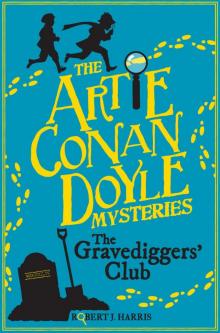 Artie Conan Doyle and the Gravediggers' Club
Artie Conan Doyle and the Gravediggers' Club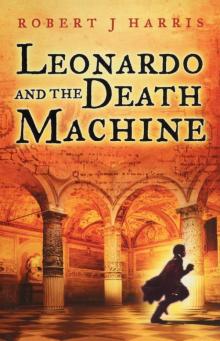 Leonardo and the Death Machine
Leonardo and the Death Machine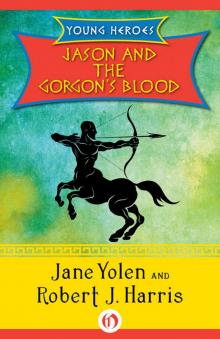 Jason and the Gorgon's Blood
Jason and the Gorgon's Blood Will Shakespeare and the Pirate's Fire
Will Shakespeare and the Pirate's Fire Odysseus in the Serpent Maze
Odysseus in the Serpent Maze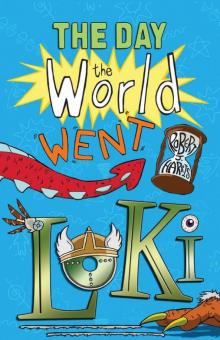 The Day the World Went Loki
The Day the World Went Loki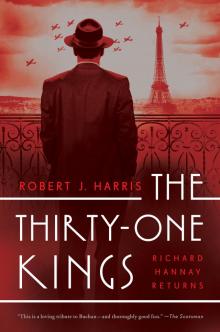 The Thirty-One Kings
The Thirty-One Kings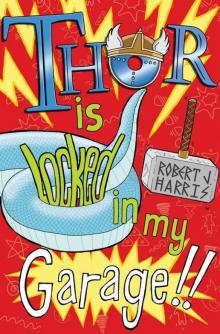 Thor Is Locked in My Garage!
Thor Is Locked in My Garage! Odin Blew Up My TV!
Odin Blew Up My TV!